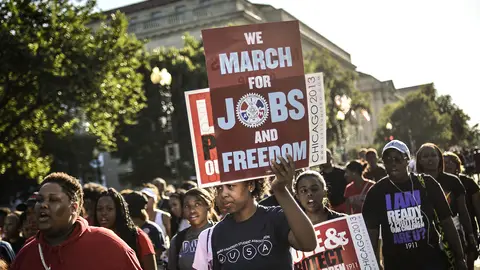American Money: Marching for a Living Wage

Last week’s commemoration of the March on Washington and this week’s celebration of Labor Day reminds us of the continued sacrifices and social and economic contributions of our country’s workers. Fifty years after the March on Washington for Jobs and Freedom left an indelible mark on the nation, we should remember that the struggle for racial equality had at its core many of the same foundations of the labor movement.
Labor organizations were key partners in efforts to advance civil rights. And yet one of the central political aims of the March has yet to be fulfilled: economic equality. Though the March was the catalyst for a series of landmark civil rights laws that helped dismantle legal racial barriers, many of the demands of the March, which included living wages and full employment, haven’t been met to this day.
It’s important not to overlook the progress that has been made on the economic front: since 1963, African-American poverty has experienced a 20 percent decline. African-Americans have also seen a 10 percent decline in making up the poorest Americans in terms of family income and a 10 percent increase in African-American representation of middle- and upper-income Americans from 1963 to today.
But in other areas, gains in racial economic equality have either remained flat or even worsened. Throughout the 50 years since the March on Washington for Jobs and Freedom, African-American unemployment has remained approximately twice that of white Americans and the current minimum wage of $7.25 is 23 percent less than it was in 1968 in real terms.
Minimum wage jobs comprise 3 of every 5 jobs created since the economic recovery. And African-Americans are more often employed in these sectors, which means they are less likely to have benefits and savings plans necessary to build their economic security.
Last week, a day after the anniversary of the March on Washington, fast food workers, along with allies, rallied in over 60 cities to protest the industry for its labor practices and demand a living wage to support themselves and their families. “I deserve to be treated with respect just like anybody else,” stated one fast food worker.
To learn more about the ongoing labor efforts and/or how to get involved, contact your local AFL CIO. And the Department of Labor provides information on services available to union members.
The progress made in closing racial disparities will not continue without a focus on bridging economic inequality. So the struggle against racial inequality, symbolized by the historic work started by the protestors in the March on Washington for Jobs and Freedom fifty years ago, must continue. And we must move forward and push for bold, forward-thinking policies such as raising the minimum wage to a living wage and ensuring employment for all to build economic security today and for generations to come.
Dedrick Asante-Muhammad is the senior director of the NAACP Economic Programs. To learn more about preventing foreclosure and personal finance, check out the NAACP Financial Freedom Center Facebook Page or on Twitter @naacpecon.
The opinions expressed here do not necessarily reflect those of BET Networks.
BET National News - Keep up to date with breaking news stories from around the nation, including headlines from the hip hop and entertainment world. Click here to subscribe to our newsletter.
(Photo: REUTERS/James Lawler Duggan)





